Project Finance and Procurement Strategies in Argentina's Energy
VerifiedAdded on 2023/06/16
|9
|2081
|327
Report
AI Summary
This report examines the challenges and strategies related to project finance and procurement in Argentina's energy sector, particularly focusing on electricity generation. It discusses the historical context of instability and privatization that impacted the sector, leading to difficulties in securing reliable energy supplies. The report analyzes the role of mediators in facilitating agreements, the hurdles faced by YPF and international investors, and the strategies employed to overcome these obstacles. It also explores the negotiation strategies used to ensure mutually beneficial outcomes for stakeholders, including YPF and international partners, while addressing the importance of a conciliatory setting for successful acquisitions. The report concludes that ethical standards and protection of investor rights are crucial for fostering growth and stability in Argentina's energy sector. Desklib offers a wealth of similar resources, including past papers and solved assignments, to support students in their academic pursuits.
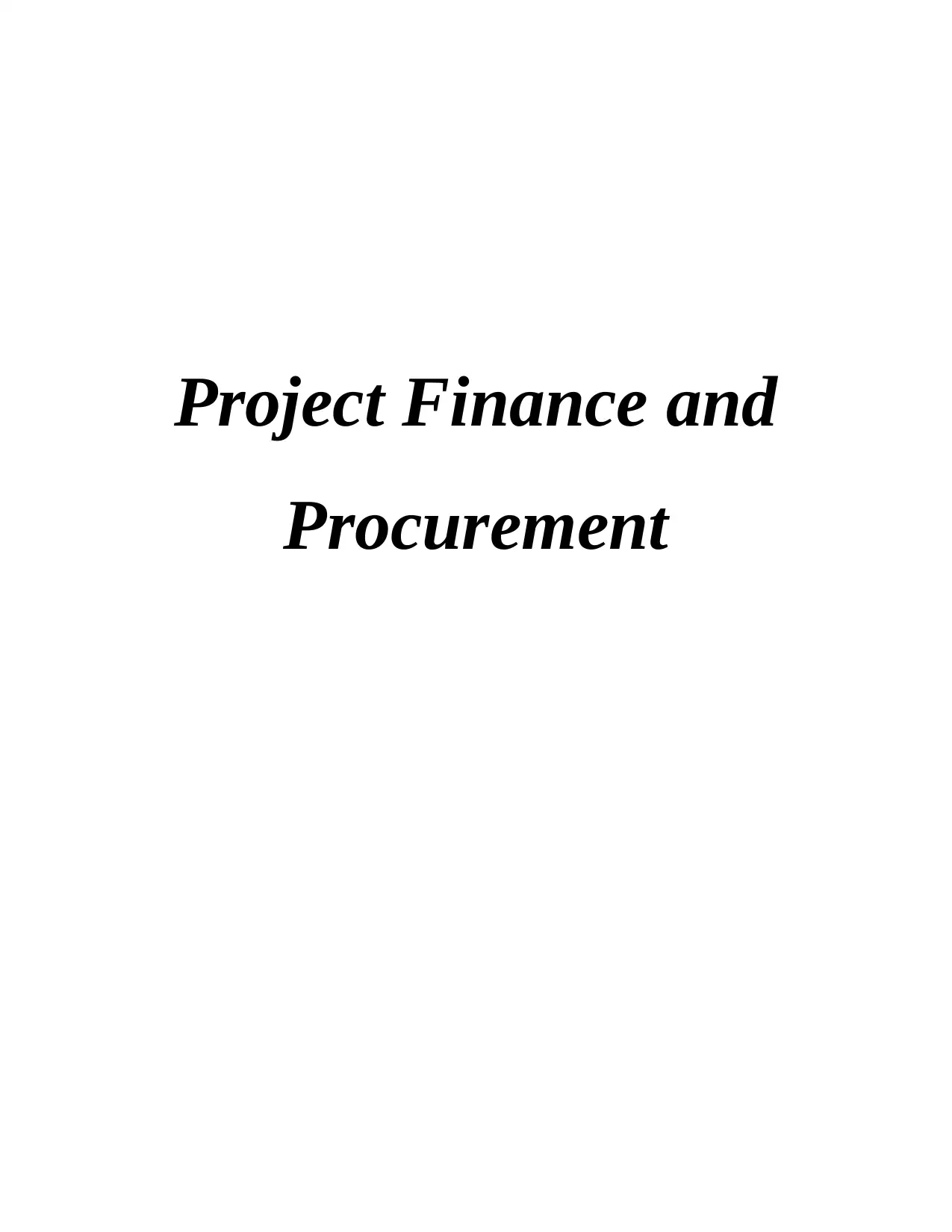
Project Finance and
Procurement
Procurement
Paraphrase This Document
Need a fresh take? Get an instant paraphrase of this document with our AI Paraphraser
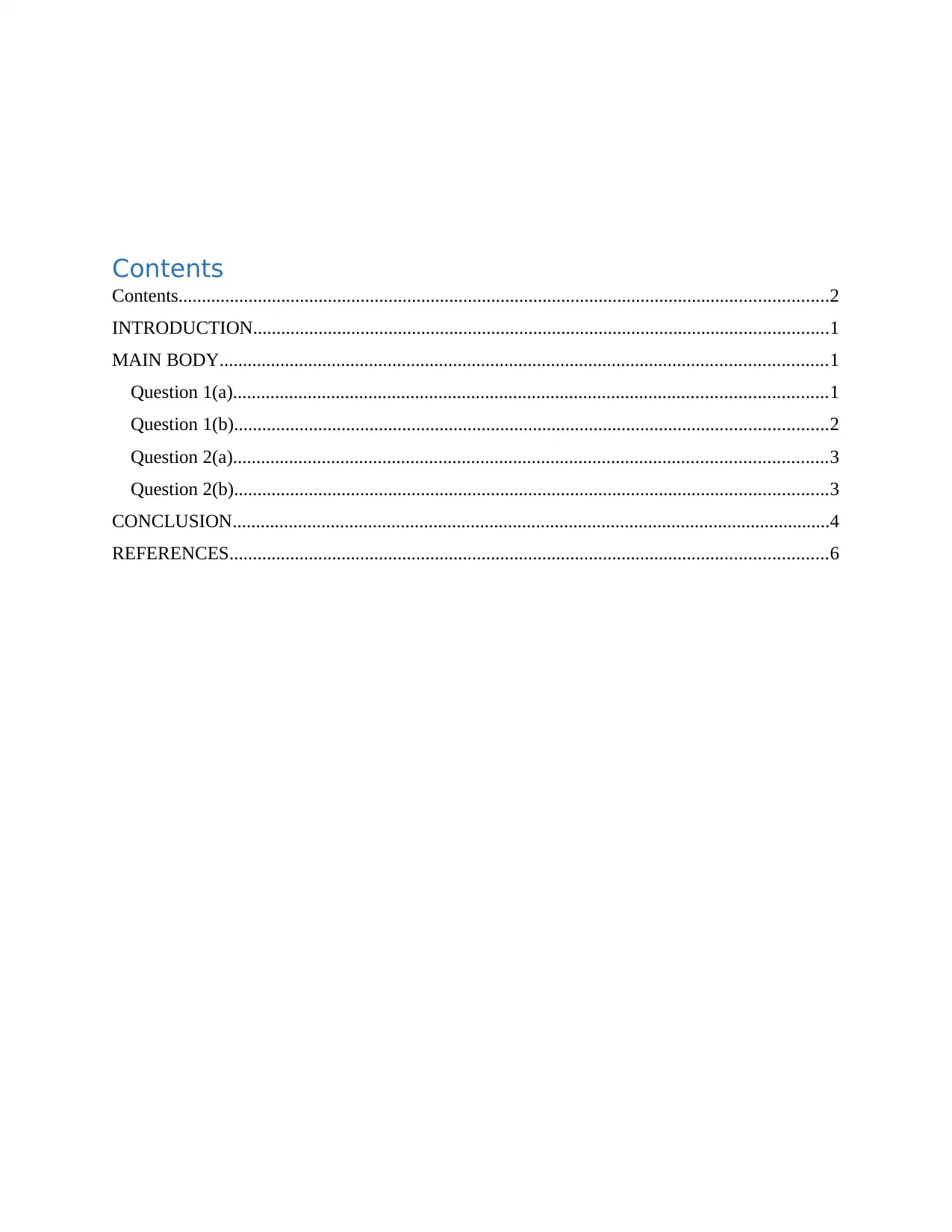
Contents
Contents...........................................................................................................................................2
INTRODUCTION...........................................................................................................................1
MAIN BODY..................................................................................................................................1
Question 1(a)...............................................................................................................................1
Question 1(b)...............................................................................................................................2
Question 2(a)...............................................................................................................................3
Question 2(b)...............................................................................................................................3
CONCLUSION................................................................................................................................4
REFERENCES................................................................................................................................6
Contents...........................................................................................................................................2
INTRODUCTION...........................................................................................................................1
MAIN BODY..................................................................................................................................1
Question 1(a)...............................................................................................................................1
Question 1(b)...............................................................................................................................2
Question 2(a)...............................................................................................................................3
Question 2(b)...............................................................................................................................3
CONCLUSION................................................................................................................................4
REFERENCES................................................................................................................................6

⊘ This is a preview!⊘
Do you want full access?
Subscribe today to unlock all pages.

Trusted by 1+ million students worldwide
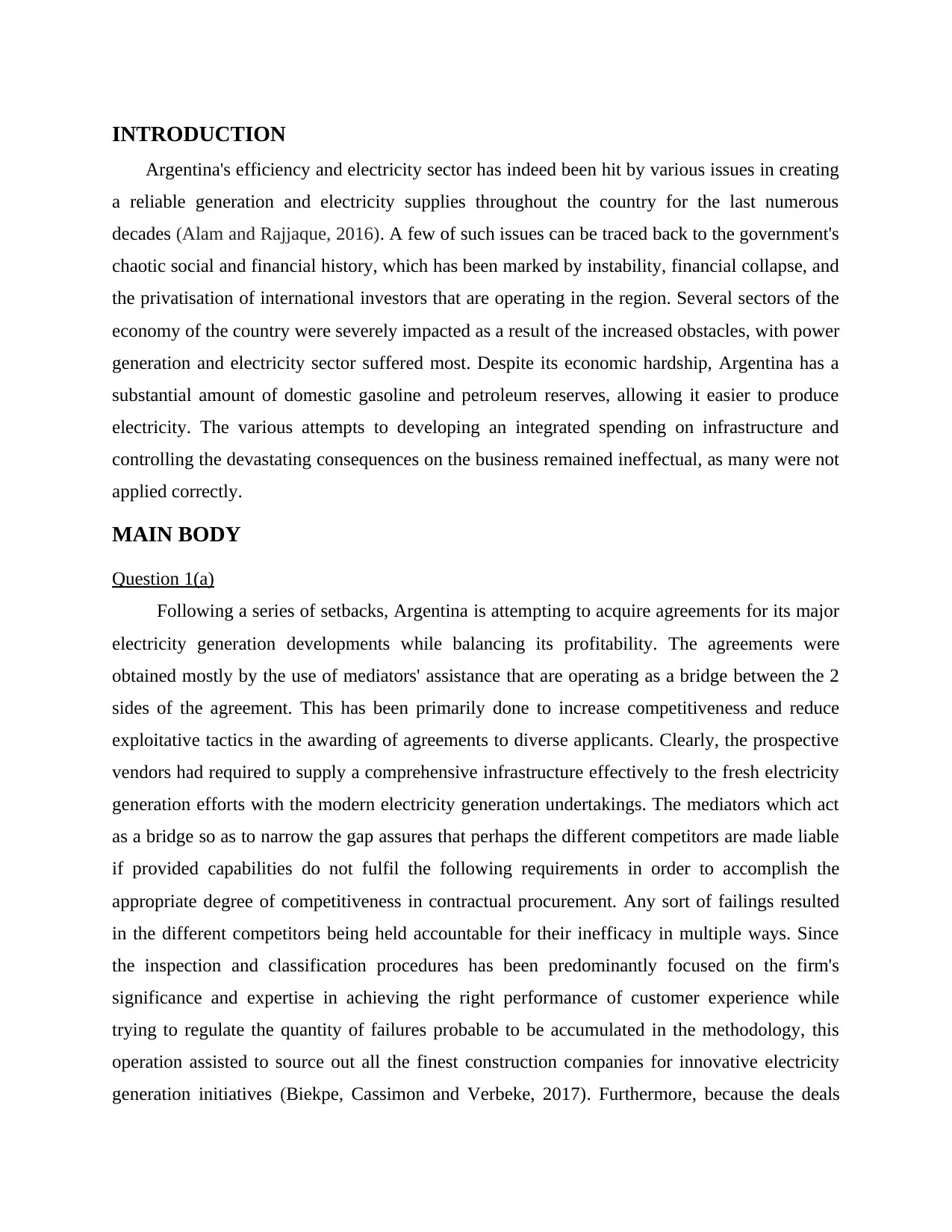
INTRODUCTION
Argentina's efficiency and electricity sector has indeed been hit by various issues in creating
a reliable generation and electricity supplies throughout the country for the last numerous
decades (Alam and Rajjaque, 2016). A few of such issues can be traced back to the government's
chaotic social and financial history, which has been marked by instability, financial collapse, and
the privatisation of international investors that are operating in the region. Several sectors of the
economy of the country were severely impacted as a result of the increased obstacles, with power
generation and electricity sector suffered most. Despite its economic hardship, Argentina has a
substantial amount of domestic gasoline and petroleum reserves, allowing it easier to produce
electricity. The various attempts to developing an integrated spending on infrastructure and
controlling the devastating consequences on the business remained ineffectual, as many were not
applied correctly.
MAIN BODY
Question 1(a)
Following a series of setbacks, Argentina is attempting to acquire agreements for its major
electricity generation developments while balancing its profitability. The agreements were
obtained mostly by the use of mediators' assistance that are operating as a bridge between the 2
sides of the agreement. This has been primarily done to increase competitiveness and reduce
exploitative tactics in the awarding of agreements to diverse applicants. Clearly, the prospective
vendors had required to supply a comprehensive infrastructure effectively to the fresh electricity
generation efforts with the modern electricity generation undertakings. The mediators which act
as a bridge so as to narrow the gap assures that perhaps the different competitors are made liable
if provided capabilities do not fulfil the following requirements in order to accomplish the
appropriate degree of competitiveness in contractual procurement. Any sort of failings resulted
in the different competitors being held accountable for their inefficacy in multiple ways. Since
the inspection and classification procedures has been predominantly focused on the firm's
significance and expertise in achieving the right performance of customer experience while
trying to regulate the quantity of failures probable to be accumulated in the methodology, this
operation assisted to source out all the finest construction companies for innovative electricity
generation initiatives (Biekpe, Cassimon and Verbeke, 2017). Furthermore, because the deals
Argentina's efficiency and electricity sector has indeed been hit by various issues in creating
a reliable generation and electricity supplies throughout the country for the last numerous
decades (Alam and Rajjaque, 2016). A few of such issues can be traced back to the government's
chaotic social and financial history, which has been marked by instability, financial collapse, and
the privatisation of international investors that are operating in the region. Several sectors of the
economy of the country were severely impacted as a result of the increased obstacles, with power
generation and electricity sector suffered most. Despite its economic hardship, Argentina has a
substantial amount of domestic gasoline and petroleum reserves, allowing it easier to produce
electricity. The various attempts to developing an integrated spending on infrastructure and
controlling the devastating consequences on the business remained ineffectual, as many were not
applied correctly.
MAIN BODY
Question 1(a)
Following a series of setbacks, Argentina is attempting to acquire agreements for its major
electricity generation developments while balancing its profitability. The agreements were
obtained mostly by the use of mediators' assistance that are operating as a bridge between the 2
sides of the agreement. This has been primarily done to increase competitiveness and reduce
exploitative tactics in the awarding of agreements to diverse applicants. Clearly, the prospective
vendors had required to supply a comprehensive infrastructure effectively to the fresh electricity
generation efforts with the modern electricity generation undertakings. The mediators which act
as a bridge so as to narrow the gap assures that perhaps the different competitors are made liable
if provided capabilities do not fulfil the following requirements in order to accomplish the
appropriate degree of competitiveness in contractual procurement. Any sort of failings resulted
in the different competitors being held accountable for their inefficacy in multiple ways. Since
the inspection and classification procedures has been predominantly focused on the firm's
significance and expertise in achieving the right performance of customer experience while
trying to regulate the quantity of failures probable to be accumulated in the methodology, this
operation assisted to source out all the finest construction companies for innovative electricity
generation initiatives (Biekpe, Cassimon and Verbeke, 2017). Furthermore, because the deals
Paraphrase This Document
Need a fresh take? Get an instant paraphrase of this document with our AI Paraphraser
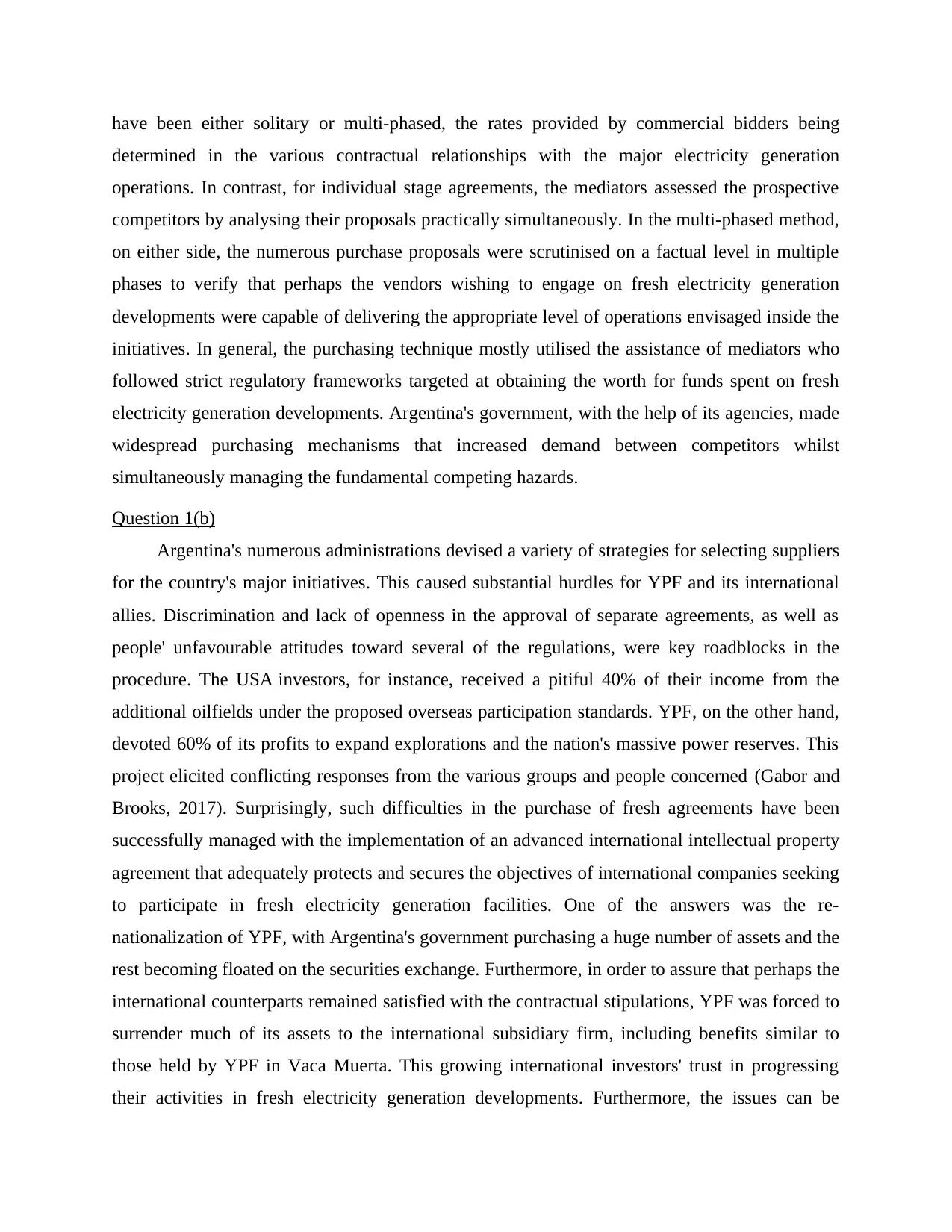
have been either solitary or multi-phased, the rates provided by commercial bidders being
determined in the various contractual relationships with the major electricity generation
operations. In contrast, for individual stage agreements, the mediators assessed the prospective
competitors by analysing their proposals practically simultaneously. In the multi-phased method,
on either side, the numerous purchase proposals were scrutinised on a factual level in multiple
phases to verify that perhaps the vendors wishing to engage on fresh electricity generation
developments were capable of delivering the appropriate level of operations envisaged inside the
initiatives. In general, the purchasing technique mostly utilised the assistance of mediators who
followed strict regulatory frameworks targeted at obtaining the worth for funds spent on fresh
electricity generation developments. Argentina's government, with the help of its agencies, made
widespread purchasing mechanisms that increased demand between competitors whilst
simultaneously managing the fundamental competing hazards.
Question 1(b)
Argentina's numerous administrations devised a variety of strategies for selecting suppliers
for the country's major initiatives. This caused substantial hurdles for YPF and its international
allies. Discrimination and lack of openness in the approval of separate agreements, as well as
people' unfavourable attitudes toward several of the regulations, were key roadblocks in the
procedure. The USA investors, for instance, received a pitiful 40% of their income from the
additional oilfields under the proposed overseas participation standards. YPF, on the other hand,
devoted 60% of its profits to expand explorations and the nation's massive power reserves. This
project elicited conflicting responses from the various groups and people concerned (Gabor and
Brooks, 2017). Surprisingly, such difficulties in the purchase of fresh agreements have been
successfully managed with the implementation of an advanced international intellectual property
agreement that adequately protects and secures the objectives of international companies seeking
to participate in fresh electricity generation facilities. One of the answers was the re-
nationalization of YPF, with Argentina's government purchasing a huge number of assets and the
rest becoming floated on the securities exchange. Furthermore, in order to assure that perhaps the
international counterparts remained satisfied with the contractual stipulations, YPF was forced to
surrender much of its assets to the international subsidiary firm, including benefits similar to
those held by YPF in Vaca Muerta. This growing international investors' trust in progressing
their activities in fresh electricity generation developments. Furthermore, the issues can be
determined in the various contractual relationships with the major electricity generation
operations. In contrast, for individual stage agreements, the mediators assessed the prospective
competitors by analysing their proposals practically simultaneously. In the multi-phased method,
on either side, the numerous purchase proposals were scrutinised on a factual level in multiple
phases to verify that perhaps the vendors wishing to engage on fresh electricity generation
developments were capable of delivering the appropriate level of operations envisaged inside the
initiatives. In general, the purchasing technique mostly utilised the assistance of mediators who
followed strict regulatory frameworks targeted at obtaining the worth for funds spent on fresh
electricity generation developments. Argentina's government, with the help of its agencies, made
widespread purchasing mechanisms that increased demand between competitors whilst
simultaneously managing the fundamental competing hazards.
Question 1(b)
Argentina's numerous administrations devised a variety of strategies for selecting suppliers
for the country's major initiatives. This caused substantial hurdles for YPF and its international
allies. Discrimination and lack of openness in the approval of separate agreements, as well as
people' unfavourable attitudes toward several of the regulations, were key roadblocks in the
procedure. The USA investors, for instance, received a pitiful 40% of their income from the
additional oilfields under the proposed overseas participation standards. YPF, on the other hand,
devoted 60% of its profits to expand explorations and the nation's massive power reserves. This
project elicited conflicting responses from the various groups and people concerned (Gabor and
Brooks, 2017). Surprisingly, such difficulties in the purchase of fresh agreements have been
successfully managed with the implementation of an advanced international intellectual property
agreement that adequately protects and secures the objectives of international companies seeking
to participate in fresh electricity generation facilities. One of the answers was the re-
nationalization of YPF, with Argentina's government purchasing a huge number of assets and the
rest becoming floated on the securities exchange. Furthermore, in order to assure that perhaps the
international counterparts remained satisfied with the contractual stipulations, YPF was forced to
surrender much of its assets to the international subsidiary firm, including benefits similar to
those held by YPF in Vaca Muerta. This growing international investors' trust in progressing
their activities in fresh electricity generation developments. Furthermore, the issues can be
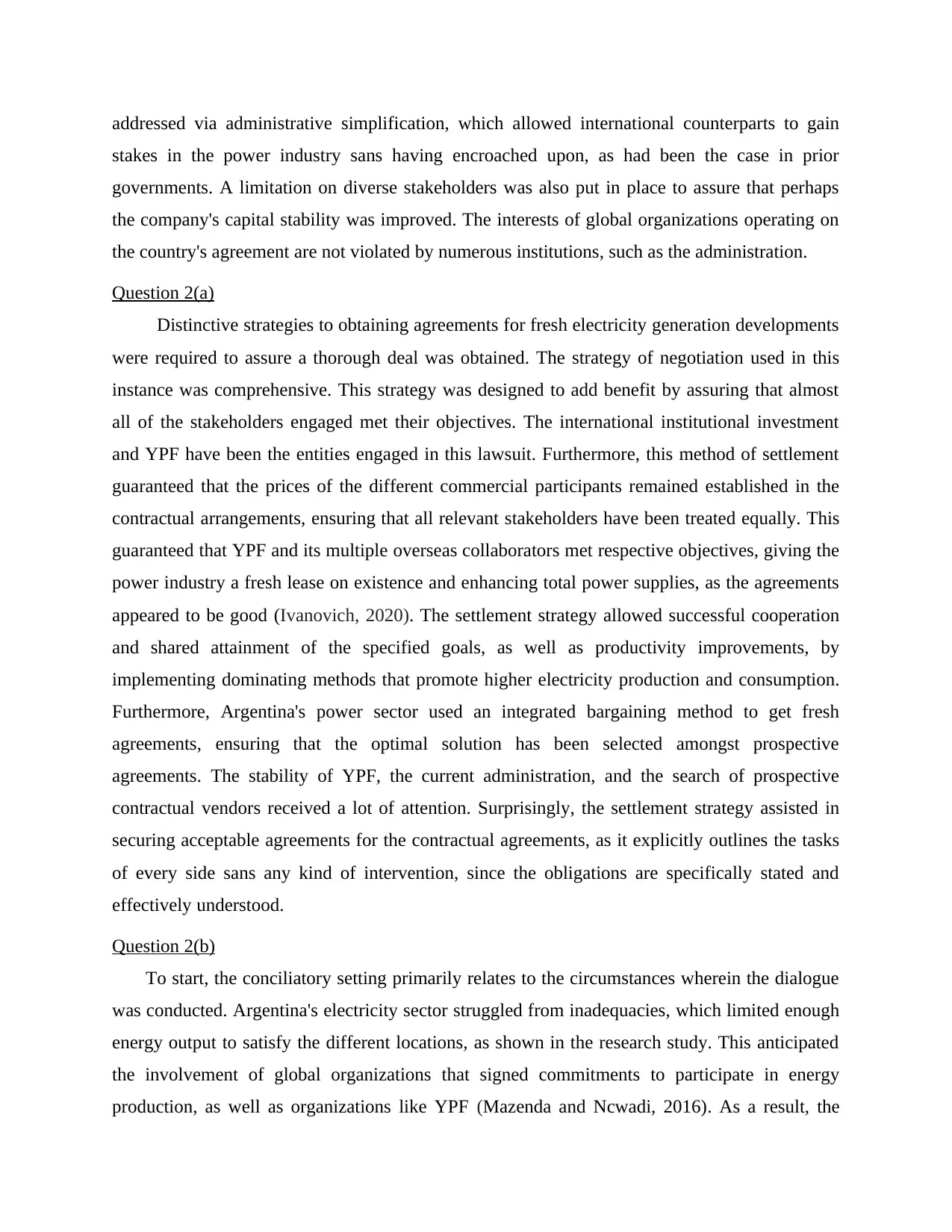
addressed via administrative simplification, which allowed international counterparts to gain
stakes in the power industry sans having encroached upon, as had been the case in prior
governments. A limitation on diverse stakeholders was also put in place to assure that perhaps
the company's capital stability was improved. The interests of global organizations operating on
the country's agreement are not violated by numerous institutions, such as the administration.
Question 2(a)
Distinctive strategies to obtaining agreements for fresh electricity generation developments
were required to assure a thorough deal was obtained. The strategy of negotiation used in this
instance was comprehensive. This strategy was designed to add benefit by assuring that almost
all of the stakeholders engaged met their objectives. The international institutional investment
and YPF have been the entities engaged in this lawsuit. Furthermore, this method of settlement
guaranteed that the prices of the different commercial participants remained established in the
contractual arrangements, ensuring that all relevant stakeholders have been treated equally. This
guaranteed that YPF and its multiple overseas collaborators met respective objectives, giving the
power industry a fresh lease on existence and enhancing total power supplies, as the agreements
appeared to be good (Ivanovich, 2020). The settlement strategy allowed successful cooperation
and shared attainment of the specified goals, as well as productivity improvements, by
implementing dominating methods that promote higher electricity production and consumption.
Furthermore, Argentina's power sector used an integrated bargaining method to get fresh
agreements, ensuring that the optimal solution has been selected amongst prospective
agreements. The stability of YPF, the current administration, and the search of prospective
contractual vendors received a lot of attention. Surprisingly, the settlement strategy assisted in
securing acceptable agreements for the contractual agreements, as it explicitly outlines the tasks
of every side sans any kind of intervention, since the obligations are specifically stated and
effectively understood.
Question 2(b)
To start, the conciliatory setting primarily relates to the circumstances wherein the dialogue
was conducted. Argentina's electricity sector struggled from inadequacies, which limited enough
energy output to satisfy the different locations, as shown in the research study. This anticipated
the involvement of global organizations that signed commitments to participate in energy
production, as well as organizations like YPF (Mazenda and Ncwadi, 2016). As a result, the
stakes in the power industry sans having encroached upon, as had been the case in prior
governments. A limitation on diverse stakeholders was also put in place to assure that perhaps
the company's capital stability was improved. The interests of global organizations operating on
the country's agreement are not violated by numerous institutions, such as the administration.
Question 2(a)
Distinctive strategies to obtaining agreements for fresh electricity generation developments
were required to assure a thorough deal was obtained. The strategy of negotiation used in this
instance was comprehensive. This strategy was designed to add benefit by assuring that almost
all of the stakeholders engaged met their objectives. The international institutional investment
and YPF have been the entities engaged in this lawsuit. Furthermore, this method of settlement
guaranteed that the prices of the different commercial participants remained established in the
contractual arrangements, ensuring that all relevant stakeholders have been treated equally. This
guaranteed that YPF and its multiple overseas collaborators met respective objectives, giving the
power industry a fresh lease on existence and enhancing total power supplies, as the agreements
appeared to be good (Ivanovich, 2020). The settlement strategy allowed successful cooperation
and shared attainment of the specified goals, as well as productivity improvements, by
implementing dominating methods that promote higher electricity production and consumption.
Furthermore, Argentina's power sector used an integrated bargaining method to get fresh
agreements, ensuring that the optimal solution has been selected amongst prospective
agreements. The stability of YPF, the current administration, and the search of prospective
contractual vendors received a lot of attention. Surprisingly, the settlement strategy assisted in
securing acceptable agreements for the contractual agreements, as it explicitly outlines the tasks
of every side sans any kind of intervention, since the obligations are specifically stated and
effectively understood.
Question 2(b)
To start, the conciliatory setting primarily relates to the circumstances wherein the dialogue
was conducted. Argentina's electricity sector struggled from inadequacies, which limited enough
energy output to satisfy the different locations, as shown in the research study. This anticipated
the involvement of global organizations that signed commitments to participate in energy
production, as well as organizations like YPF (Mazenda and Ncwadi, 2016). As a result, the
⊘ This is a preview!⊘
Do you want full access?
Subscribe today to unlock all pages.

Trusted by 1+ million students worldwide
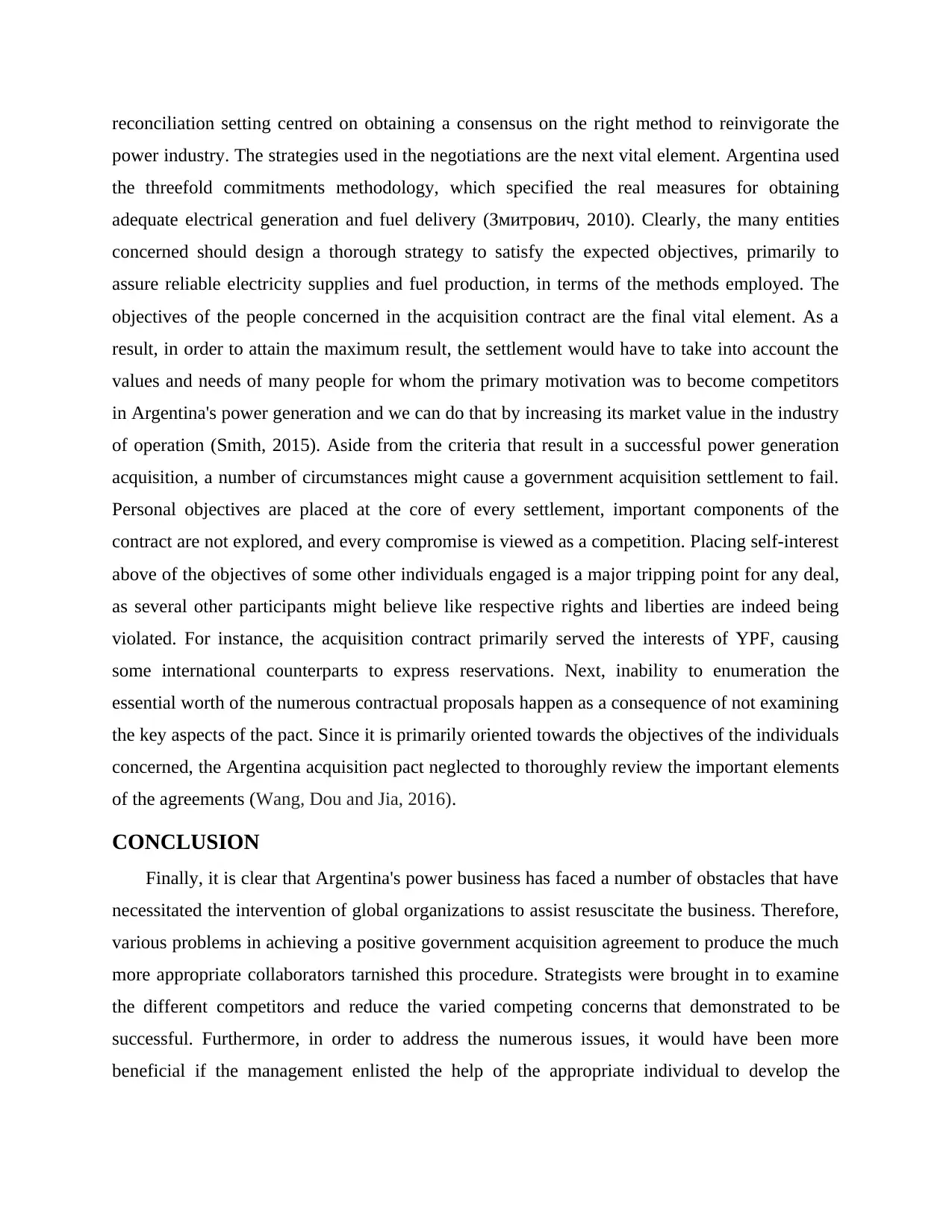
reconciliation setting centred on obtaining a consensus on the right method to reinvigorate the
power industry. The strategies used in the negotiations are the next vital element. Argentina used
the threefold commitments methodology, which specified the real measures for obtaining
adequate electrical generation and fuel delivery (Змитрович, 2010). Clearly, the many entities
concerned should design a thorough strategy to satisfy the expected objectives, primarily to
assure reliable electricity supplies and fuel production, in terms of the methods employed. The
objectives of the people concerned in the acquisition contract are the final vital element. As a
result, in order to attain the maximum result, the settlement would have to take into account the
values and needs of many people for whom the primary motivation was to become competitors
in Argentina's power generation and we can do that by increasing its market value in the industry
of operation (Smith, 2015). Aside from the criteria that result in a successful power generation
acquisition, a number of circumstances might cause a government acquisition settlement to fail.
Personal objectives are placed at the core of every settlement, important components of the
contract are not explored, and every compromise is viewed as a competition. Placing self-interest
above of the objectives of some other individuals engaged is a major tripping point for any deal,
as several other participants might believe like respective rights and liberties are indeed being
violated. For instance, the acquisition contract primarily served the interests of YPF, causing
some international counterparts to express reservations. Next, inability to enumeration the
essential worth of the numerous contractual proposals happen as a consequence of not examining
the key aspects of the pact. Since it is primarily oriented towards the objectives of the individuals
concerned, the Argentina acquisition pact neglected to thoroughly review the important elements
of the agreements (Wang, Dou and Jia, 2016).
CONCLUSION
Finally, it is clear that Argentina's power business has faced a number of obstacles that have
necessitated the intervention of global organizations to assist resuscitate the business. Therefore,
various problems in achieving a positive government acquisition agreement to produce the much
more appropriate collaborators tarnished this procedure. Strategists were brought in to examine
the different competitors and reduce the varied competing concerns that demonstrated to be
successful. Furthermore, in order to address the numerous issues, it would have been more
beneficial if the management enlisted the help of the appropriate individual to develop the
power industry. The strategies used in the negotiations are the next vital element. Argentina used
the threefold commitments methodology, which specified the real measures for obtaining
adequate electrical generation and fuel delivery (Змитрович, 2010). Clearly, the many entities
concerned should design a thorough strategy to satisfy the expected objectives, primarily to
assure reliable electricity supplies and fuel production, in terms of the methods employed. The
objectives of the people concerned in the acquisition contract are the final vital element. As a
result, in order to attain the maximum result, the settlement would have to take into account the
values and needs of many people for whom the primary motivation was to become competitors
in Argentina's power generation and we can do that by increasing its market value in the industry
of operation (Smith, 2015). Aside from the criteria that result in a successful power generation
acquisition, a number of circumstances might cause a government acquisition settlement to fail.
Personal objectives are placed at the core of every settlement, important components of the
contract are not explored, and every compromise is viewed as a competition. Placing self-interest
above of the objectives of some other individuals engaged is a major tripping point for any deal,
as several other participants might believe like respective rights and liberties are indeed being
violated. For instance, the acquisition contract primarily served the interests of YPF, causing
some international counterparts to express reservations. Next, inability to enumeration the
essential worth of the numerous contractual proposals happen as a consequence of not examining
the key aspects of the pact. Since it is primarily oriented towards the objectives of the individuals
concerned, the Argentina acquisition pact neglected to thoroughly review the important elements
of the agreements (Wang, Dou and Jia, 2016).
CONCLUSION
Finally, it is clear that Argentina's power business has faced a number of obstacles that have
necessitated the intervention of global organizations to assist resuscitate the business. Therefore,
various problems in achieving a positive government acquisition agreement to produce the much
more appropriate collaborators tarnished this procedure. Strategists were brought in to examine
the different competitors and reduce the varied competing concerns that demonstrated to be
successful. Furthermore, in order to address the numerous issues, it would have been more
beneficial if the management enlisted the help of the appropriate individual to develop the
Paraphrase This Document
Need a fresh take? Get an instant paraphrase of this document with our AI Paraphraser

highest ethical standards to assures that overseas immediate shareholders profited from their
investments and also that one‘s rights weren't really infringed by numerous different individuals.
investments and also that one‘s rights weren't really infringed by numerous different individuals.
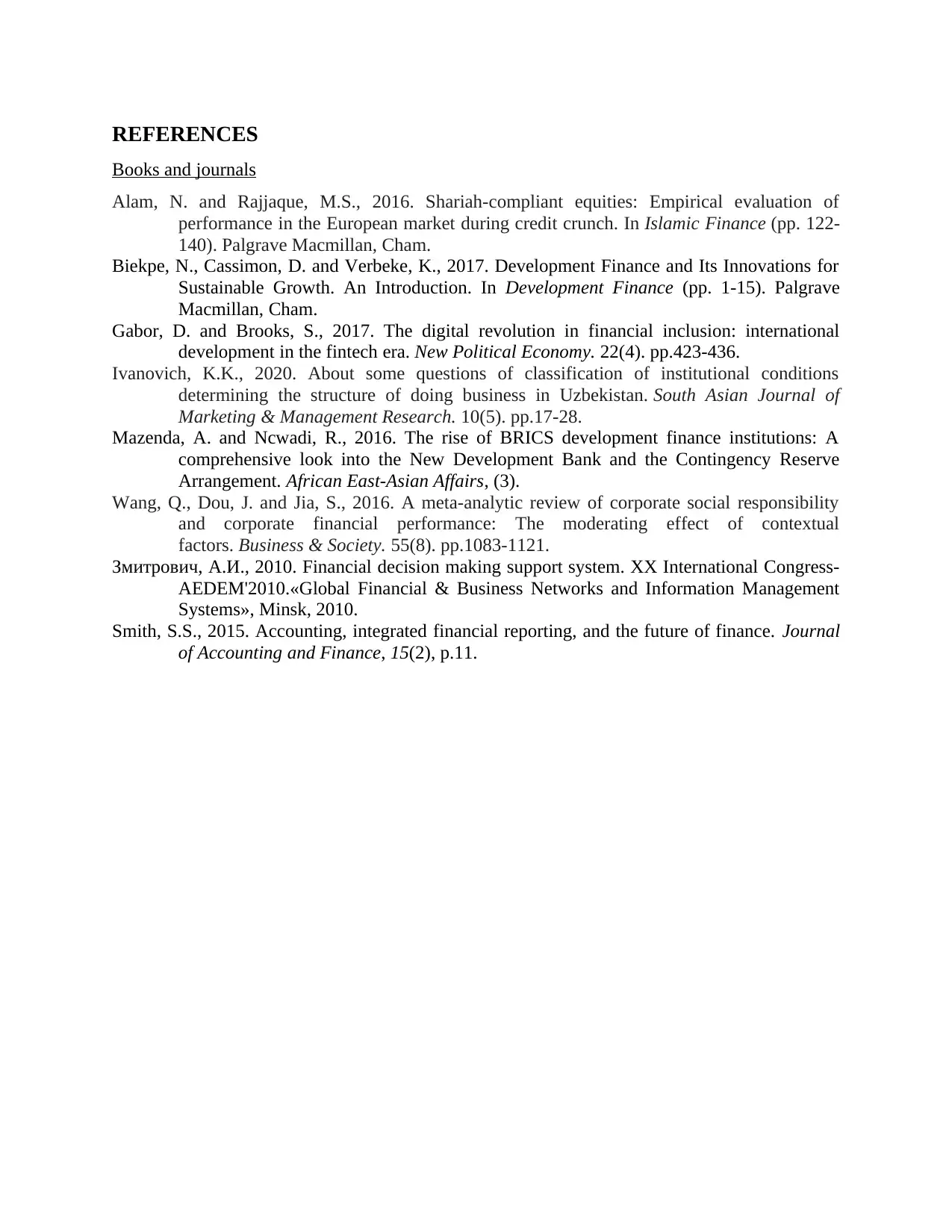
REFERENCES
Books and journals
Alam, N. and Rajjaque, M.S., 2016. Shariah-compliant equities: Empirical evaluation of
performance in the European market during credit crunch. In Islamic Finance (pp. 122-
140). Palgrave Macmillan, Cham.
Biekpe, N., Cassimon, D. and Verbeke, K., 2017. Development Finance and Its Innovations for
Sustainable Growth. An Introduction. In Development Finance (pp. 1-15). Palgrave
Macmillan, Cham.
Gabor, D. and Brooks, S., 2017. The digital revolution in financial inclusion: international
development in the fintech era. New Political Economy. 22(4). pp.423-436.
Ivanovich, K.K., 2020. About some questions of classification of institutional conditions
determining the structure of doing business in Uzbekistan. South Asian Journal of
Marketing & Management Research. 10(5). pp.17-28.
Mazenda, A. and Ncwadi, R., 2016. The rise of BRICS development finance institutions: A
comprehensive look into the New Development Bank and the Contingency Reserve
Arrangement. African East-Asian Affairs, (3).
Wang, Q., Dou, J. and Jia, S., 2016. A meta-analytic review of corporate social responsibility
and corporate financial performance: The moderating effect of contextual
factors. Business & Society. 55(8). pp.1083-1121.
Змитрович, А.И., 2010. Financial decision making support system. XX International Congress-
AEDEM'2010.«Global Financial & Business Networks and Information Management
Systems», Minsk, 2010.
Smith, S.S., 2015. Accounting, integrated financial reporting, and the future of finance. Journal
of Accounting and Finance, 15(2), p.11.
Books and journals
Alam, N. and Rajjaque, M.S., 2016. Shariah-compliant equities: Empirical evaluation of
performance in the European market during credit crunch. In Islamic Finance (pp. 122-
140). Palgrave Macmillan, Cham.
Biekpe, N., Cassimon, D. and Verbeke, K., 2017. Development Finance and Its Innovations for
Sustainable Growth. An Introduction. In Development Finance (pp. 1-15). Palgrave
Macmillan, Cham.
Gabor, D. and Brooks, S., 2017. The digital revolution in financial inclusion: international
development in the fintech era. New Political Economy. 22(4). pp.423-436.
Ivanovich, K.K., 2020. About some questions of classification of institutional conditions
determining the structure of doing business in Uzbekistan. South Asian Journal of
Marketing & Management Research. 10(5). pp.17-28.
Mazenda, A. and Ncwadi, R., 2016. The rise of BRICS development finance institutions: A
comprehensive look into the New Development Bank and the Contingency Reserve
Arrangement. African East-Asian Affairs, (3).
Wang, Q., Dou, J. and Jia, S., 2016. A meta-analytic review of corporate social responsibility
and corporate financial performance: The moderating effect of contextual
factors. Business & Society. 55(8). pp.1083-1121.
Змитрович, А.И., 2010. Financial decision making support system. XX International Congress-
AEDEM'2010.«Global Financial & Business Networks and Information Management
Systems», Minsk, 2010.
Smith, S.S., 2015. Accounting, integrated financial reporting, and the future of finance. Journal
of Accounting and Finance, 15(2), p.11.
⊘ This is a preview!⊘
Do you want full access?
Subscribe today to unlock all pages.

Trusted by 1+ million students worldwide
1 out of 9
Your All-in-One AI-Powered Toolkit for Academic Success.
+13062052269
info@desklib.com
Available 24*7 on WhatsApp / Email
![[object Object]](/_next/static/media/star-bottom.7253800d.svg)
Unlock your academic potential
Copyright © 2020–2026 A2Z Services. All Rights Reserved. Developed and managed by ZUCOL.